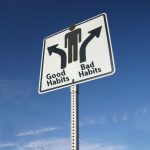7 Healthy Social Media Habits for Students

Establishing healthy social media habits is an important goal for any student just setting up their first accounts or wily veterans of these platforms looking to launch a new brand identity. Unfortunately, there are many missteps that can occur as you set out to use it.
In the following article, we’ll be discussing the best social media habits to employ. We’ll also be discussing which behaviors to avoid. Before we get there, though, let’s set the record straight about social media. Is it a good thing or a bad thing?
Why Use Social Media in the First Place?
A lot of the advice that comes with using social media can paint it out to be a bad thing. However, that’s not the case. Yes, it can be abused, misused, and intrusive, but it can also serve some positive purposes. You probably already know some of these. One or more might even be the reason you set up your first account. Let’s examine the reasons to use social media:
- To cultivate friendships: you can make some genuine friendships on social media. In fact, it really opens up your world by connecting you to people who share a lot of the same views and interests as you.
- To give potential schools and employers a taste of who you are: everyone in a position of power and decision-making looks to social media to learn more about the applicants for a school or position. Not having a social media page is almost as much of a black mark these days as misusing it. There’s something of a “what are they hiding” mindset that happens when schools or employers can find no record of you.
- To learn: yes, there is a lot of misinformation on social media. However, there’s a lot of information there as well. You can use it to learn more about healthcare, current events, hobbies, and more!
- To be entertained: there are millions and millions of websites out there with compelling content. Social media often tailors this content based on your interests, guaranteeing to keep you entertained for hours (okay, that’s a benefit and a drawback).
Now that you know there are legitimate reasons to use social media, you don’t have to feel guilty about doing so. However, you will want to stick with the following best practices to get the most out of it.
1. Do Not Use Social Media to Impress Others
Using social media to impress others is a vapid move that can lose you friends and self-respect. The best accounts online are the ones that get real from time to time. They don’t seek attention in a “look at how well I’m doing” sort of way.
People know that’s rubbish. We’ve been using long enough now to know the people who try to show off on social media, the Chrissy Teigens of the world for instance, from the ones who are genuinely interesting. When you live to impress others on social media, then that becomes your whole identity and you automatically become less interesting.
Worst of all, you’ll know why you’re doing what you do even if others take a longer time to figure it out. In time, you’re going to be controlled by reactions, comments, and shares more than you are your actual self. Maybe that’s sort of what the singularity will be like when the robots take us over. Until then, however, you’re in charge of your life. Don’t let a social networking platform take that away from you.
2. Cull Followers and Follows From Time to Time
To get the most out of social media, it really should be adding value to your life. If you don’t prune the tree from time to time, that’s not going to happen. In fact, that’s what leads to the dreaded “doomscrolling.”
Take a moment each week or month to go through your friends list. Also, go through the pages and people you’re following. Remind yourself why these connections exist. If the reason is no longer compelling enough in your mind, then trim the fat.
Unfollow, delete, or, if you’re uncomfortable doing either, pause seeing posts from them for a time period. The more people and pages you follow, the less likely you will be to see things that might genuinely interest you. That’s because the algorithm tries to feed your interests based on who you’re connected to rather than who’s the most interesting.
If you let these connections build up over time, this is what will happen. You’ll see just enough of interest to keep scrolling through all the crap that isn’t. As a result, you waste a lot more time than you ever enjoy using social media.
3. Choose Your Responses Wisely
Social media is a breeding ground for negativity. As you grow your following, you’ll inevitably pick up some trolls or negative people along the way. Don’t feed into it.
You have control over who gets a response from you and who doesn’t. You have control over what’s posted to your page or feed and what stays there. If someone chimes in trying to take a post in a direction you do not approve of, get rid of it.
If you do choose to respond, don’t get into any back-and-forths with people. That’s fruitless, and it gives them the attention they crave. Instead, set the tone clearly regarding what you accept and what you don’t. If you feel compelled to, you can always respectfully explain yourself to the person in the DMs. But you don’t owe anyone anything.
4. Turn Off Notifications
Notifications can be helpful when you’re starting out, but the larger and more bloated your accounts get, they really are hindrances. Eventually, you get so tired of the dings that you stop looking at them. If they’ve become easy for you to ignore, then why have them at all?
They are unnecessary distractions designed to keep you coming back to social media. It’s not the intention of sites like Facebook and Twitter to manage your time for you. They want all of it because that creates better revenue streams for them.
Cutting out notifications will ensure that you only get on social media when you want to be. You can always catch up on the meaningful messages and conversations then. On your terms!
5. Always Be Mindful of Time
Some people prefer to track the amount of time they spend on social media. It’s a well-meaning practice but ultimately not a good idea.
When you track your time, one of two things will happen. You’ll either get down on yourself because you’re spending too much time on social media. Or, you’ll spend more time than necessary because you’ve “allotted” yourself a set number of hours.
A better way of handling the time you spend is to simply be mindful of it. The way to do this is to be purposeful when it comes to using social media. Tell yourself you can use it, but you have to spend as little time as possible. Control this by voicing (either outwardly or inwardly) the reason you’re logging on.
- “I’m just getting on to check my messages.”
- “I’m just going to see what’s on my notifications.”
- “I just want to see what funny articles Cracked.com has posted since the last time.”
- “I’m just going to check in with the groups I follow.”
Whatever the reason or reasons, you can then log on, take care of business, and log out. You’ll find that this mindfulness for how you use social media will lead to spending less time on there altogether.
6. Forget FOMO
FOMO is the fear of missing out. We all have it, and social media did little to get rid of it. In fact, FOMO may not have even been alive as a concept until the first social media account went online.
However, you need to forget FOMO this very minute. It’s not real. It’s not real because what you fear missing out on is a fabrication of actual life. (Coincidentally, this is the same reason you shouldn’t use social media to impress others; in that case, you contribute to the FOMO problem.)
Everyone posts the best-curated content to their social streams. They seldom take the time to show you the mundane, the boring, the inadequate, the embarrassing. You’re getting a very tiny snapshot of their lives because they’re creating a brand for themselves. You’re not getting the rest because, let’s face it, it’s depressing, uninteresting, humiliating, or all of the above.
So, stop worrying about what you’re missing out on. Start getting away from that type of content or just remind yourself of what it is. Marketing. Not real life.
7. Keep It Positive
The last of the healthy social media habits we want to leave you with is positivity. You need to keep things positive. Notice that we didn’t say “Fake,” we said “Positive.”
That leaves room for you to post about anything you want, including life lessons, wins and losses, milestones, and tragedies. It’s all about taking a hopeful view of your own world.
If life is so rotten that you need to gripe about it, do so through a trained professional. Seek therapy or a close friend or family member who is there to listen. Social media is not the place to air your grievances. There’s enough negativity there without you adding to it, and you’re just going to make others think that’s who you are 24/7.
These Healthy Social Media Habits Will Keep It From Being a Drain
The reason we share the above healthy social media habits with you is not to seem holier-than-thou or make you feel guilty. Nope. We want you to get the most out of social media.
It can be an incredible tool if you commit to the positives and eliminate the negatives. To do that, though, you’ll need to be more mindful about the effective and ineffective ways to use it. Good luck! Now it’s your turn. Share some of your best healthy social media habits in the comments section below!
[Featured Image by Wikimedia Commons]








